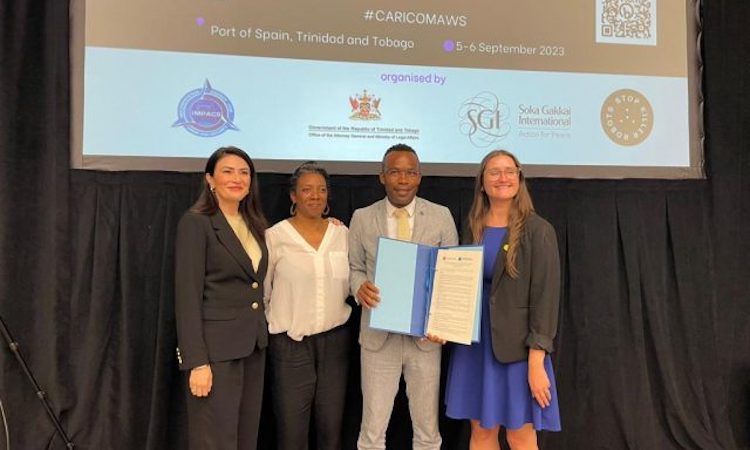By Peter Richards*
DIEGO MARTIN, Trinidad & Tobago. 28 September 2023 (IDN) — Caribbean countries have signalled their intention of moving against autonomous weapons systems (AWS) or “killer robots,” developing a common position on the issue that will find favour with the 15-member Caribbean Community (CARICOM) grouping. (P19) French | Japanese | Spanish
AWS are weapons systems that use artificial intelligence to identify, select, and kill human targets without human intervention. For the Caribbean region, particularly Jamaica, Trinidad and Tobago and the Bahamas, grappling with an upsurge in murders, AWS present a formidable challenge.
The United Nations Chief of Service at the Office of Disarmament Affairs, Melanie Regimbal, said the objective is to understand the framework under which laws are starting to be looked at and studied.
“In this case, it is the convention on certain conventional weapons and the idea is to bring on board many of the Caribbean states that are not a party to this convention,” she added.
Trinidad and Tobago’s Attorney General, Regional Armour, has already indicated that he intends making recommendations to the Cabinet of Prime Minister Dr. Keith Rowley with the intention of developing legislation to regulate how these algorithm-driven autonomous weapons are going to populate the earth.
“If my recommendations are accepted, we will be taking that to our Law Reform Commission to develop serious policy that will then inform the legislation,” he added.
But Port of Spain is not alone. At a two-day (5-6 September 2023) gathering on “Achieving the Universalisation of the Convention on Certain Conventional Weapons,” held here in early September, several Caribbean countries, including Barbados and Belize, acknowledged that AWS present a “complex and contentious issue” that requires careful consideration and thoughtful discussions among various stakeholders.
Barbados, for example, noted that while these weapons possess the potential for significant military advantage, their adoption also raises serious ethical and practical concerns.
“One of the primary concerns surrounding lethal autonomous weapons is the potential loss of human control over critical decision-making in warfare,” Bridgetown told the meeting that brought together government officials from across the Caribbean and members of international organisations, technical experts, academia, and civil society organisations.
Belize is encouraging all CARICOM member states to engage in ongoing discussions that can initiate the negotiating process for a treaty on the prohibition of AWS, noting that “we all have a fundamental duty to safeguard human rights, ensure human safety and contribute to international peace and security.
“Belize shares the same common humanitarian, legal and security concerns with the region and the international community regarding AWS. Belize, therefore, stands ready to support the declaration for a regional position on AWS that upholds the universalized principles and norms of international law.”.

Display of the CARICOM Declaration on autonomous weapons systems. From right to left: H.E. Maritza Chan Valverde, Ambassador, Permanent Mission of Costa Rica to the United Nations; Hayley Ramsay-Jones, Geneva Director, Soka Gakkai International Office for UN Affairs; Callixtus Joseph, Regional Crime and Security Strategy Coordinator, CARICOM IMPACS and Isabelle Jones, Campaign Outreach Manager, Stop Killer Robots. Source: CARICOM
In its presentation to the meeting that was organised by CARICOM Implementation Agency for Crime and Security (CARICOM IMPACS), Soka Gakkai International (SGI) and the UK-based Stop Killer Robots, Trinidad and Tobago said it recognises the enormous threat posed to the lives of civilians with the potential indiscriminate use of autonomous weapons and supports the need to maintain meaningful human control in order to safeguard the civilian population.
“Trinidad and Tobago underscores the potential for these weapons to arbitrarily and indiscriminately cause severe injury, destruction and loss of lives…(and) therefore reiterates its support for the adoption of new legally binding rules to prohibit and regulate autonomous weapons systems.”
The Campaign Outreach Manager for “Stop Killer Robots”, Isabelle Jones told reporters here that international discussions have actually been ongoing for the last decade “but this is a really urgent and pressing issue for political leaders, governments and for the international community.
“More and more we are seeing increasing use and development of weapon systems that have autonomy in them,” said Jones.
SGI said that as an NGO working to promote peace, culture and education based on Buddhist principles, “we believe in human dignity and hold that life and death decisions should never be delegated to machines.
“We have learnt that without regulation, autonomous weapons could be proliferated globally, including amongst non-state actors which could increase crime regionally, exacerbate social inequalities, overwhelm resources and infrastructures of countries, as well as undermine social and national security.”
The workshop here was informed that the call for a legally binding instrument is supported by over 90 States, the UN Secretary-General, experts in technology and artificial intelligence, faith leaders, and civil society organisations globally.
At the end of their deliberations, the conference delegates adopted the “CARICOM Declaration on Autonomous Weapons Systems,” reiterating the call for new legally binding measures within the domain of AWS to ensure compliance with international law as well “as emphasizing the necessity of incorporating human and social considerations into the negotiation of a global AWS instrument and subsequent national legislation”.
The Declaration notes the resolve of Caribbean countries “to support the indispensability of meaningful human control over the use of force and thereby encourage the pursuit of an international legally binding instrument which incorporates prohibitions and regulations on AWS”.
They have also agreed to maintain a unified stance across all pertinent platforms, prioritizing the creation of an international legally binding instrument on AWS, “which takes into consideration issues relating to non-proliferation and the risks of diversion to non-state actors, including non-state armed groups and terrorist groups, and the challenges of AWS to internal and domestic security, including law enforcement and border security.”
There is also a commitment to work with CARICOM IMPACS and other relevant stakeholders to promote an agreed position on AWS and that states should acknowledge the perils of proliferation, unintended escalation, ethical considerations, digital dehumanisation, and other human and social implications associated with AWS, including digital discrimination based on race, ethnicity, nationality, class, religion, gender, age, or other status”.
The Declaration calls upon international organisations, development partners, the private sector, academia, and other relevant stakeholders to contribute financial and technical assistance and capacity-building initiatives, in order to enable CARICOM member states “to meaningfully engage in multilateral discussions on autonomous weapons systems and bridge the gap of technological disparities that may result in increased vulnerability of CARICOM states”.
*Peter Richards is a St. Lucia-born Caribbean journalist who is also the senior editor with the Barbados-based Caribbean Media Corporation (CMC). [IDN-InDepthNews]
Image credit: Stop Killer Robots.












